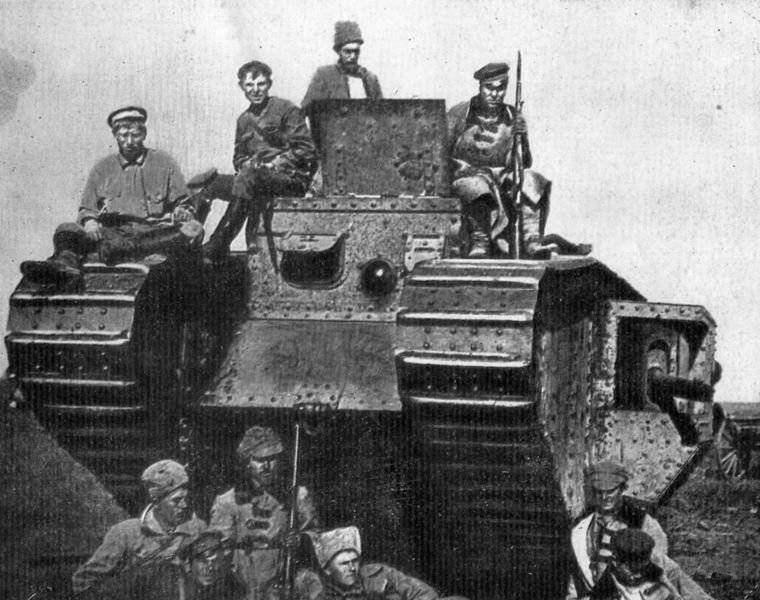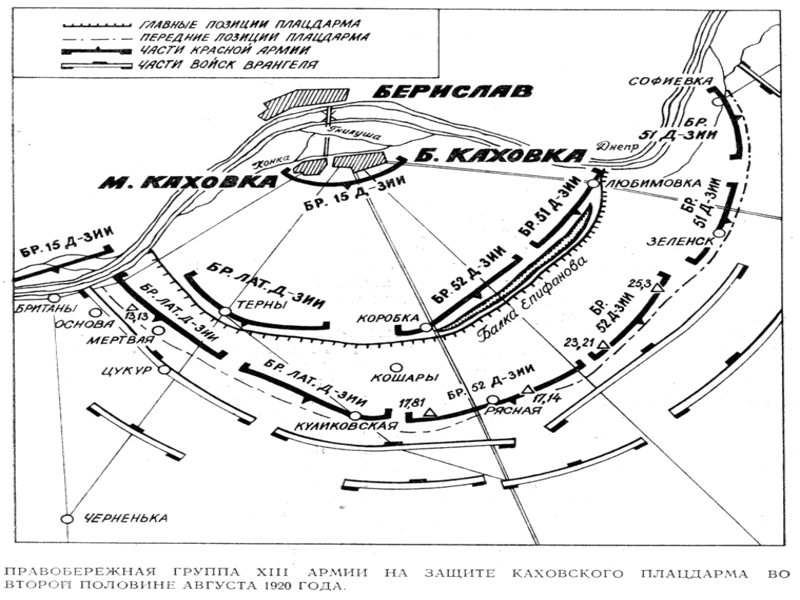Battle for Kakhovsky bridgehead

By the beginning of August 1920, the Russian army of Wrangel achieved a number of obvious successes. She defended the Crimea, escaped from the peninsula, occupied Northern Tavria, repelled the Red Army's attempt to surround and destroy itself, defeated the Redneck group. However, these successes did not have a decisive character and the Wranglew, even despite their breakthrough from the Crimea, remained still locked in Northern Tavria and were doomed to defeat in these conditions. It was necessary to do something to radically change the situation in their favor. White units could hold out against the superior forces of the Red Army only thanks to the "maneuver" of the same units. Infinitely it could not continue.
The White Command understood this well and took steps to change the situation. It was decided to send an airborne detachment to Don so that it would raise an uprising. On July 9 east of Mariupol, a detachment of 800 soldiers was landed under the command of Colonel Nazarov. He occupied the village of Novonikolaevskaya. But the red command took into account the experience of previous white operations fleet and created by this time its Azov flotilla of 13 ships. The Red Azov flotilla went to sea and after the battle, forced to retreat the white ships that brought Nazarov reinforcements. Then the flotilla bombarded Novonikolaevskaya. At the same time, troops were being pulled together. The Red Command overestimated the enemy’s forces, forming an entire strike group — one infantry and two cavalry divisions. On July 15, Nazarov’s detachment was able to break through to the east and launched a raid on the villages, hoping to raise the Don Cossacks. Its number increased to 1,5 thousand people, but there was no uprising on the Don. The Don region was tired of the war and was bloodless. Some Cossacks fell on the fronts of the First World War, fought the most violently for the whites and red, others mobilized by force, the region was devastated by the plague epidemic.
In the area of Konstantinovskaya 25 July Nazarov’s detachment was blocked and pressed against the Don. White defeated. Part of the squad was destroyed, some fled. Nazarov with the group left for Manych, but was overtaken and the detachment was finally defeated. Colonel himself was able to escape. He was later detained, but Nazarov was able to impersonate a simple soldier. In autumn I reached the Crimea.
In the middle of July there was a relative lull at the front. Both sides were actively preparing for a new battle. Due to mobilization in Tavria, rear units and garrisons that healed the injured, the Russian army managed to bring the 35 thousand people with 178 guns and 38 airplanes to the end of the month. Reds at that time had about 45 thousand people with 270 guns and 45 airplanes. True, the red forces were replenished at a faster pace, and new fresh units were thrown to the front. Already in the course of the battle, 4 rifle divisions, one cavalry division, 3 brigades, several armored units were deployed. In addition, the red divisions were more powerful in number than the divisions of the white army. In particular, the 51 th infantry division deployed from Siberia under the command of Blucher was a real “giant” of the 16 regiments, with its cavalry, artillery and armored cars (the personnel of the division numbered up to 33 thousand). Only in service of this division were 499 machine guns, 43 guns, 10 armored vehicles. To reinforce the 13 Army, the 2 Army was formed (2, 16, 20, and 21 Cavalry Divisions), headed by Gorodovik (since September Mironov). And the commander of the 13-th army instead of Eideman (he replaced the Spider) was Uborevich.
The Red Command planned to strike in early August, but the whites delivered a preemptive strike. July 25 Corps Kutepov launched an offensive in the north, on Aleksandrovsk, Yekaterinoslav. White broke through the front, defeating the 3 and 46 divisions. The Kuban cavalry Babiyev was introduced into the breakthrough. White captured the Nuts. For the development of success, Wrangel threw into the battle of Barbovich's cavalry corps. The red pieces fiercely resisted, struck counterattacks, but the whites advanced at great cost. 2 August was captured by Aleksandrovsk. This success is over. White units suffered heavy losses and ran out of steam. The Red Command quickly liquidated the breakthrough, and having received reinforcements, the Red Army launched a counter-offensive. White troops began to roll back to their previous positions. On August 4, the Red forces recaptured Aleksandrovsk, the 6s of the Orekhovs and Bedbills, and the 8s of Berdyansk.
The offensive of the Red Army. Fighting on the Kakhovsky bridgehead
After repelling the attack of the Wrangel, and restoring the former front line, the Red Army launched an offensive. The plan remained the same: a blow from the western direction to Perekop and from the northeast to Melitopol. However, the preparation of the operation was more serious. To force the Dnieper again chose the area Kakhovka. For the strike, the Latvian, 15, and 52 divisions were concentrated; they had to force the river with the support of the Dnieper Flotilla and two heavy weapon divisions.
On the night of August 8, the units of the 15, 52 and Latvian rifle divisions of the Red Army successfully crossed the Dnieper and captured Kakhovka. The total area of the bridgehead was 216 square. km, depth - 12-15 km. A ferry was erected in the rear. On August 10, units of the Blucher 51 Infantry Division began to arrive at the bridgehead. From the white side, this line was defended by the Slaschov corps. This general showed himself well in a maneuverable war, dashing cavalry raids, but in a positional war he was not up to par. Intelligence led poorly, did not show proper attention to the coast defense, considering that he would easily dislodge the enemy with a counterstrike. As a result, although this was already the second attempt of the Red Army to break through in this direction, Slashcheva was taken by surprise. When Slashchev counterattacked, there was already too much strength on the left bank. White could not knock out the enemy to the other side.
The Red Army began to push the troops of Slaschova to Perekop. 12 August red parts reached the line Big Kopani - B. Mayachka - Lyubimovka - Belotserkovka. At the same time, the red command conducted a mobilization of the able-bodied population in Kherson and, under the leadership of D. M. Karbyshev, the construction of fortified lines began on the Kakhovka bridgehead. There were ramparts, trenches rummaged, dugouts, artillery positions, wire barriers were built. Work went day and night. Construction materials were carried along the Dnieper. By October 13, three defense lines were constructed: 1) was on the outskirts of the village of Bolshaya Kakhovka - the bridgehead defense line; 2) passed through the villages of Terna - Box - Lyubimovka and was the main line of defense. Here were the 2-3 line of trenches, company strong points reinforced with wire barriers and connected by lines of messages. Anti-personnel and anti-tank mines were put on the most dangerous areas; 3) along the line of Yekaterinoslavka - Sofievka - Lyubimovka - to the south of the Sukhino farm - the bank of the Dnieper went the front line of defense. She was standing out of separate trenches and platoon strongholds, sometimes covered with wire barriers. In order to cover the Kakhovsky bridgehead, an aviation group of I. U. Pavlov was deployed. Crossings defended anti-aircraft artillery group. The artillery on the bridgehead was reduced to three groups, not counting anti-aircraft artillery: the art group of direct support of the troops, the art group for conducting the counter-battery struggle and the anti-tank artillery reserve.

In the eastern direction, the Red Army did not do so well. The 2th Cavalry Army, reinforced by the 1th Rifle Division, advanced along the Goon group from Tokmak to Melitopol. The Red Army broke through the front, but the cavalrymen of the Gorodovikov failed to go deeper into the white rear. Kutepov's body hit the flank. White split the 2 Conarmy into two parts: the three advanced cavalry divisions were separated from the infantry and the rest of the cavalry. After a fierce battle, the red parts moved away, the blow was reflected. After the elimination of this breakthrough, Wrangel began to transfer the Barbovich cavalcorpus with armored cars to the left flank.
On August 12, the corps Slashchev and Barbovich launched a counter-offensive and rejected the advancing red units to the fortified bridgehead. Fierce fighting continued until 20 in August, but all attacks on Kakhovka were broken on powerful defenses. Slashchev began to accuse the high command of "mistakes", and was removed from his post. True, with honor, he was awarded the title of Slashchev-Crimean for past services and sent on leave. The corps was led by General Vitkovsky. But this did not change the situation. Fierce fighting on the Kakhovsky bridgehead continued until the end of October 1920. The parties exchanged blows. Wrangel's army was unable to eliminate this bridgehead, which led to a noticeable weakening of the position of the white army and the subsequent retreat of Perekop.
Information